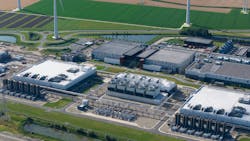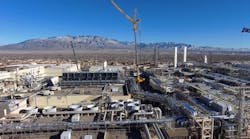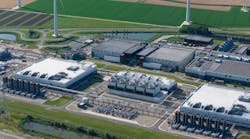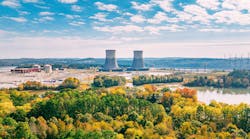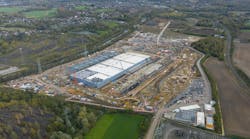From Cloud to Concrete: How Explosive Data Center Demand is Redefining Commercial Real Estate
Key Takeaways
- Global data generation is expected to hit 181 ZB in 2025, driving record demand for hyperscale and colocation data centers and related infrastructure.
- Investors view data centers as a prime mix of real estate, utilities, and mission-critical infrastructure with stable, recurring revenue.
- Location drivers include power availability, sustainability, and scalable land, thus pushing growth to suburban and rural sites.
- Demand for powered land is high, with developers and nontraditional buyers such as EV and chip makers competing for sites and driving up prices in top-tier markets.
- The U.S. accounts for 44% of the global data center capacity; Virginia alone has 15.4 GW in the pipeline.
- Real estate investment giants expanding into the data center market with acquisitions, joint ventures, and fund creations include Blackstone, Eaton Corp., Digital Realty, KKR & Co. Inc., DigitalBridge Group, and Jones Lang LaSalle.
The world will generate 181 ZB of data in 2025, an increase of 23.13% year over year and 2.5 quintillion bytes (a quintillion byte is also called an exabyte, EB) created daily, according to a report from Demandsage. To put that in perspective: One exabyte is equal to 1 quintillion bytes, which is 1,000,000,000,000,000,000 bytes. That’s 29 TB every second, or 2.5 million TB per day. It’s no wonder data centers have become so crucial for creating, consuming, and storing data — and no wonder investor interest has skyrocketed.
The surging demand for secure, scalable, high-performance retail and wholesale colocation and hyperscale data centers is spurred by the relentless, global expansion of cloud computing and demand for AI as data generation from businesses, governments, and consumers continues to surge. Power access, sustainable infrastructure, and land acquisition have become critical factors shaping where and how data center facilities are built.
As a result, investors increasingly view these facilities not just as technology assets, but as a unique convergence of real estate, utility infrastructure, and mission-critical systems. Capitalizing on this momentum, private equity and real estate investment firms are rapidly expanding into the sector through acquisitions, joint ventures, and new funds—targeting opportunities to build and operate facilities with a focus on energy efficiency and scalability.
This convergence has created a complex yet highly attractive market, driven by long-term leases, steady recurring revenue, and high tenant retention—perfectly aligning with the strategies of major players such as Blackstone, Eaton Corp., Digital Realty, KKR & Co., DigitalBridge Group, and Jones Lang LaSalle.
Recent Q2 earnings reports from most of these companies showed significant gains, underscoring the strength of their strategies. One exception was DigitalBridge, which posted a surprising -211.11% shortfall due to factors unrelated to digital infrastructure, though management reaffirmed its focus on expanding data center operations.
These firms are building and operating colocation data centers for hyperscalers and other key market participants, both capitalizing on and accelerating sector growth while shaping market trends. Let’s examine some of these.
Real Estate and Infrastructure Investment Trends
Massive investments in data centers not only underscore the surging demand for storage and processing power, but also reveal the sector’s deep connections to real estate trends, energy consumption, and the broader wave of global digital transformation. Real estate investment giants targeting the data center market are driving several key trends, including:
- Land Demand and Suburban Shift. Larger site acquisitions for phased campus developments are becoming the norm, pushing data-center projects away from urban cores and into suburban and rural areas. Virginia, Phoenix, and Sydney, Australia rank among the top markets for land availability, because developers prioritize locations that support scalability and power integration.
- Record Pipeline Growth. The U.S. accounts for 44% of the global data center capacity, according to Visual Capitalist, with Virginia boasting a staggering 15.4GW in its development pipeline. Other regions like Phoenix, Dallas-Fort Worth, and Atlanta also are experiencing substantial growth and investment. Together, the U.S. and China account for 70% of the global total. Land values remain a top consideration in mature markets, driving greater attention to more cost-effective emerging locations like Pennsylvania and Johor, Malaysia.
- Powered Land in Premium Demand. Land with pre-secured utility commitments is in high demand, with developers and even nontraditional buyers such as electric vehicle (EV) and chip manufacturers competing for sites. These parcels offer a guaranteed path to power amid rising power constraints and long utility lead times.
- Investment Surges Across the Real Estate Spectrum. The sector continues to attract a sharp rise in joint ventures, mergers, and acquisition activity across colocation, hyperscale, and infrastructure outfits. Firms are increasingly targeting both established and emerging markets, fueling rapid pipeline growth and positioning data centers as one of the fastest-growing real estate asset classes globally.
- Land Pricing and Competition Intensify. With all this interest in land and capacity, increased competition in top-tier markets has driven pricing upward. Midwestern U.S. markets such as Indianapolis and Iowa remain among the most affordable, attracting spillover demand from more expensive neighbors.
In the following segments, we look at strategic moves investment giants have made recently, their Q2 earnings key metrics, and how they’re contributing to data center market growth trends.
Blackstone
Leadership at global investment giant Blackstone has a specific strategy to invest in the data center and support growing energy infrastructures, make acquisitions, and form joint ventures to broaden portfolio. The firm is a major player in private equity and alternative asset management, with investment strategies that include real estate, infrastructure, and credit.
For example, Blackstone's acquisition of QTS Realty Trust for $10 billion in 2021 was a significant step into the data center market, and leaders said their hopes are to build QTS into the fastest-growing data center company in the world. The company also acquired Asia-Pacific data center giant AirTrunk in 2024, in a deal valued at $24 billion.
Other recent investments behind its strategy for electricity demand growth and the ongoing infrastructure build include the following:
- In August, leadership announced an agreement to acquire data analytics energy intelligence platform Enverus from Hellman & Friedman and Genstar Capital. Enverus is a comprehensive data analytics platform providing capital allocation and asset optimization for 8,000 customers in 50 countries for access to analytics, insights, and benchmark data from generative AI and partnerships, with more than 95% of U.S. energy producers and 40,000 suppliers. According to the company, it’s the largest and fastest-growing SaaS company and analytics provider dedicated to the energy market.
- In July, Blackstone made a significant growth investment into IT services provider NetBrain to rapidly expand network automation and AI solutions to global enterprises, at a $750 million valuation.
- The firm also invested more than $25 billion in Pennsylvania’s digital and energy infrastructure, plus accelerate an additional $60 billion investment.
- And, the company invested in a $600 million senior secured credit facility with Aligned Data Centers, financing the development of Aligned’s newest and largest facility in West Jordan, Utah. Technology infrastructure company Aligned Data Centers provides sustainable, adaptive, scale data centers and build-to-scale solutions for global hyperscale and enterprise customers.
- The firm acquired Potomac Energy Center in January, a power infrastructure in Virginia supporting data centers and AI.
- Last year, Blackstone acquired EVES Group S.à r.l, the parent company of SEDIVER Group, a provider of specialized electrical insulator products for the high-voltage transmission grid, in the UK.
- Also last year, the firm made a majority investment in Westwood Professional Services, an engineering and design firm focused on renewables, power, real estate, and public infrastructure markets in the U.S.
- Blackstone also aquired Trystar, a designer and manufacturer of critical electrical power solutions for data center, industrial, commercial, healthcare, and utility markets.
- In July, the firm announced a joint venture with PPL Corp. to build, own, and operate new gas-fired, combined-cycle generation stations to power data centers in Pennsylvania under long-term energy services agreements (ESAs). The firms plan to develop front-of-the-meter generation that sits atop the Marcellus and Utica shale basins that can quickly connect to significant, available gas pipeline capacity, and target areas of significant data center interest.
As part of its expansion in Japan, Blackstone has executed a number of high-profile transactions, including a tender offer of $3.5 billion for TechnoPro, a Japanese IT services provider and Blackstone’s largest investment to date in Japan; Sony Payment Services, a carveout of Sony’s payment service provider; and I’rom, a Japanese site management organization. The firm has also partnered with Japanese financial institutions.
In their Q2 earnings call in late July, Blackstone managers reported outstanding results, with net earnings increasing 25% Y-o-Y to $1.6 billion for the quarter. Infrastructure appreciated 2.9% in the quarter and 19% for the last 12 months. Management recognized ongoing market uncertainties, including tariffs, policy uncertainty and geopolitical instability.
Eaton Corp.
Intelligent power management and investment company Eaton Corp. is also active in the acquisition game, including the following moves:
- In July, the firm announced its acquisition of Resilient Power Systems, a developer and manufacturer of energy solutions, including solid-state transformer-based technology. The acquisition is part of the firm’s strategy to accelerate commercialization of solid-state transformer technology for future global applications in data centers and energy storage, with Eaton leaders expecting Resilient’s technology to have application potential to allow data-center customers to increase power density and revenue generation.
- In March, Eaton acquired Fibrebond for $1.4 billion in a deal that has the potential to reshape the data center industry. It signifies a major strategic move to expand Eaton’s presence in the data center market. Fibrebond specializes in pre-integrated modular power enclosures for data centers, industrial, utility, and communications customers. This acquisition is expected to allow Eaton to cater to the accelerating demand for faster deployment in hyperscale and multi-tenant data centers.
Eaton’s Q2 2025 earnings call in August highlighted strong operational performance, record revenue, and expanding margins, with a clear emphasis on boosting capacity and accelerating data center growth. The company posted a record $7 billion in quarterly revenue, driven by a 12% increase in Electrical Americas organic sales and a roughly 50% surge in data center sales—well above the expected low -30% range. Executives stressed a sharpened strategic focus on data centers and other high-growth markets.
Digital Realty
Digital Realty, global provider of cloud- and carrier-neutral data center, colocation, and interconnection solutions, has been expanding its data center portfolio through significant acquisitions and fund creations, both domestically and internationally. Some of the most recent include:
- In 2024, it acquired a data center in the Slough Trading Estate in the UK for $200 million, marking their entry into the west London market and designed to expand their digital portfolio.
- The firm launched a U.S. Hyperscale Data Center Fund this year to attract significant investment, targeting $2.5 billion in equity commitments to support about $10 billion of hyperscale investments. The fund includes five operating assets and four land sites. New market expansions included a data center in Indonesia and the launch of a Heraklion facility in Crete to improve connectivity in the Eastern Mediterranean. In addition, partnerships with companies such as Console Connect and Microsoft expanded global connectivity options.
The company’s July earnings report showed strong momentum from its data center investments. Year-over-year data center revenue growth accelerated from 7% in Q1 to 11% in Q2. Bookings in the 0–1+ MW interconnection segment—covering physical and virtual links that connect data centers for data exchange and resource sharing—hit a record $90 million, up from $69 million in Q1. The firm also delivered 96 MW of new capacity, 98% of it pre-leased; expanded its land bank to 3.7 GW; and reported a $9 billion gross data center development pipeline.
KKR & Co. Inc.
Global investment firm KKR & Co. Inc. has made several significant acquisitions and investments, reflecting their strategic focus on digital infrastructure. Some of their recent moves include the following:
- At the end of July 2025, KKR was in advanced talks to acquire Singapore-based ST Telemedia Global Data Centres via Redeemable Preference Shares in a deal that could exceed $5 billion. At the time, KKR already held a 14.1% stake in the company. This investment targets Asia-Pacific AI-driven data center growth.
- Also in July, Energy Capital Partners and KKR announced development of a new hyperscale data center campus in Bosque County, Texas. This project is part of their $50 billion strategic partnership to support AI infrastructure growth. The campus is colocated with Calpine’s natural gas power plant and represents a first-of-its-kind dedicated power agreement with a hyperscaler anchor. It’s expected to be operational by Q4 2026.
KKR reported a total revenue of $5.09 billion for Q2 2025, with net income of $472 million. The earnings call focused primarily on optimism about new strategic initiatives in life sciences, and did not focus on data centers.
DigitalBridge Group, Inc.
Global alternative asset manager DigitalBridge Group, a provider of integrated power solutions for the digital infrastructure sector and energy constraints faced by data centers in Tier I and II markets, recently made the following investments.
- DigitalBridge and La Caisse acquired Yondr Group, a global hyperscale data center developer, owner, and operator, from Cathexis Holdings for $5.8 billion. The deal strengthens their digital infrastructure partnership and positions Yondr to expand in key markets, meeting rising demand for hyperscale and AI-driven data-center solutions. Yondr serves major tech companies, with more than 420MW of capacity committed to hyperscalers and land to scale beyond 1GW.
- DigitalBridge and ArcLight, with both major investors focused on electrification and digital infrastructures, this year made a $500 million investment commitment to Takanock, LLC, a provider of digital and power infrastructure solutions. The strategy is to accelerate innovative solutions for powering data centers in constrained markets.
DigitalBridge’s Q2 earning results were surprising, with a substantial revenue shortfall of -$3.21 million against an expected $104.37 million, marking a surprise of -103.08%. A significant reversal of carried interest allocation, amounting to $115.1 million, negatively impacted revenue. Also, along with potential headwinds related to market conditions and power infrastructure constraints caused investor concerns about the company's financial stability, according to investing.com.
CEO Mark Ganzi said the firm is launching new strategies in private wealth and digital power and highlighted its AI infrastructure strategy.
JLL
Global commercial real estate and investment management company Jones Lang LaSalle Inc. (JLL) recently made these acquisitions:
- It acquired renewable energy banking firm Javelin Capital in March 2025 to enhance the firm’s capabilities in the U.S. energy and infrastructure markets.
- Last year, the firm also acquired SKAE Power Solutions, a North America-based renewable energy investment banking firm, to strengthen JLL's data center solutions portfolio.
With President and Global CEO Christian Ulbrich noting the firm’s investments in data technology and AI are integral to its growth strategy, JLL’s revenue for Q2 2025 was reported at $6.25 billion during its August earnings call, an increase of 10%. This figure represents an 11% increase Y-o-Y compared to the same period in 2024.
From Cloud to Concrete
For the world outside the industry, the explosive surge of AI and cloud computing is no longer confined to virtual abstractions; it is reshaping the physical landscape of commercial real estate. From Virginia’s rolling countryside to industrial parks in Phoenix and the growing campuses of Johor, hyperscale and colocation facilities are redefining land use, power infrastructure, and long-term investment strategies at a global scale.
Data centers have become the connective tissue between digital demand and physical development, a convergence of real estate, utilities, and mission-critical systems. The result is a market where the competition for powered land is as fierce as the race to deploy the next generative AI platform, and where every acre and megawatt becomes a building block for the next phase of digital transformation.
For investors, developers, and enterprises alike, the future of the cloud is increasingly grounded in concrete, steel, and substations. The next wave of digital infrastructure will be built not just on fiber and silicon, but on the physical realities of power grids, land availability, and construction timelines.
As hyperscale demand continues its relentless growth, the winners will be those who can translate vision into capacity, connecting capital to construction, and cloud to concrete.
About the Author

Theresa Houck
Senior Editor
Theresa Houck, Senior Editor, is an award-winning B2B journalist with more than 35 years of experience. She writes about strategy, policy, and economic trends for EndeavorB2B on topics including data centers, cybersecurity, IT, OT, AI, manufacturing, industrial automation, energy, and more. With a master’s degree in communications from the University of Illinois Springfield, she previously served as Executive Editor for four magazines about sheet metal forming and fabricating at the Fabricators & Manufacturers Association, where she also oversaw circulation, marketing, and book publishing. Most recently, she was Executive Editor for the award-winning The Journal From Rockwell Automation publication on industrial automation where she also hosted and produced podcasts, videos and webinars; produced eHandbooks and newsletters; executed social media strategy; and more.
